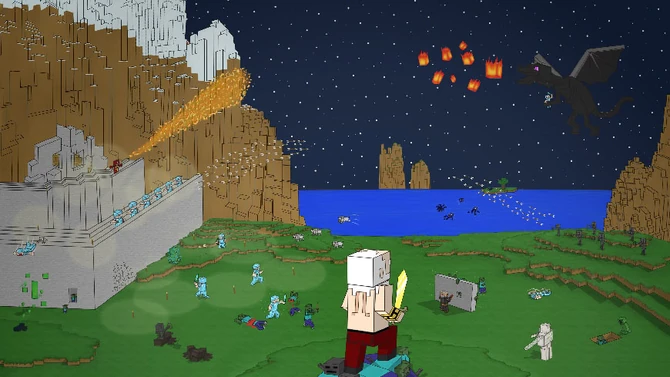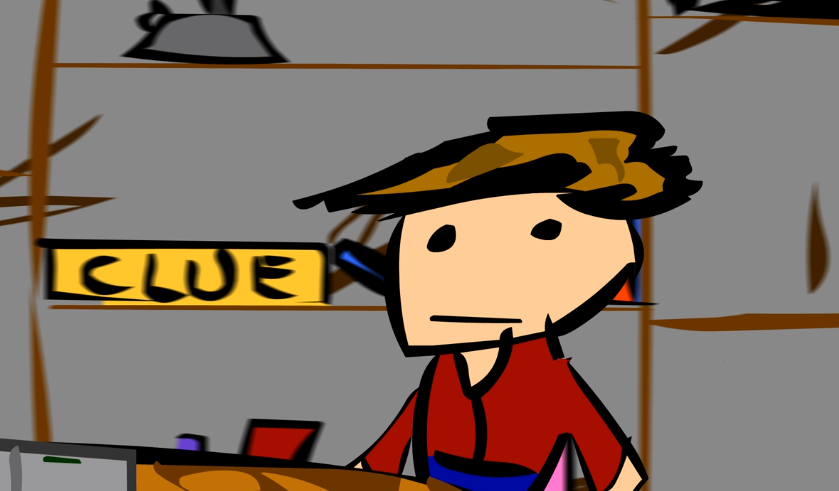Analysis - Unforgotten Realms
I intend for there to be little talking about video games on this blog other than what I make and what influences me in game design. However, I do want to talk about this game at the moment and analyse it. Sure, I may be a very small blog right now, and that anything I say here will probably never impact the game development or its popularity. Yet, I feel that it is worth discussing the good, bad, and ugly of some games to learn from them. Thereby, I want to talk about URealms for analysis.
I've been viewing the creator, Robert Moran (A.K.A. BruceWillakers or OldManWillakers on youtube), for a long time, back to when he was making Youtube videos of minigames in Minecraft. He made some interesting stuff in Minecraft, such as an assault-type game called Dwarves Vs. Zombies. As the title implies a group of players as Dwarves must defend against players that are zombies. He had himself (as OldManWillakers) be a playable character in the game for a single Dwarf player each game. The game ended when all the Dwarves were dead.
Now, of course, he didn't make this game himself, I need to give as much credit to his friend Nisovin. The two, along with a bunch of other major minecraft youtubers of a while ago, helped to make it a good, popular game. While the Minecraft server it was on was never as popular as the mega-servers around that time, it showed how great a minigame can be in Minecraft.
An fan image used for the Dwarves vs Zombies wiki. In the center is Rob's minecraft character.
A while later, he and the group Buffalo Wizards formed another Minecraft server called Lords of Minecraft. This was a server to accompany a youtube series of them roleplaying on the server as rulers of certain districts within the server. It did not get as much popularity as his previous game (though it attracted much of the people from that game), but he made an interesting series from it.
Yet, neither of those things, as great as they are (I may make an analysis of those later), are what I want to talk about today. I want to talk about his roleplaying game: Unforgotten Realms (Urealms for short).
The concept of the game was created many years ago by Rob over 11 years ago. URealms started off as a series of animations on Newgrounds. It later got remade on the Escapist in 2009. Unfortunately, I have seen little of that besides the first few episodes. Yet, again, I'm talking about the game loosely based of these animations.
This is probably the most boring screenshot I took of the first URealms episode.
What originally started as a campaign with friends to help fund a kickstarter in 2015 quickly became a tabletop roleplaying game that was played live every now and then. Rob usually played as the dungeon master with his friends Coestar, Roamin, Justin, and Deadbones as players in the stories. Sometimes other people would come along such as Nisovin or his friend Milbee. This livestream event quickly took over as much of the content of Rob's channel.
Originally, there was no public version. People made mods in Tabletop Simulator with all the cards, tiles, and maps they could find. Finding people to play it with was hard. However, over this summer, the group released an official and free mod for Tabletop Simulator along with a forum. This gave many fans, including myself, access to the game. I've played many campaigns now, and understand the game in a way different from when I was simply watching people play it. I've also seen people on sites unrelated to URealms starting to play the game. Sure some things, such as the puppet program used by the group, have not much good public equvivelints. Yet, I say that anyone can play URealms. It's the only tabletop game I've been able to understand.
Now let's talk about this game rather than its history. One of the most interesting parts is its character creation. What's interesting is that there is not much to it. When making a D&D or Pathfinder character, I constantly have to check the guides to see what affects what and what I should write down. Sure, it let for much depth, but as much complexity as well. Meanwhile, mostly everything in URealms is on a card instead of a book. While I do think that a guide would help dungeon masters by having all information of the game in one place, the cards help the starting player out by showing all the information about what that card is for.
The character creation table.
In URealms, character creation is simple: One picks a cards for their race, class, cornerstone, and atrributes. One then picks up your abilities and items from the amount of money one has (which is determined by a dice roll and the prior cards). It may not exactly be that simple, as some cards can affect character creation, but that's the basics of it. With that, you got a character. The only stats you really need to deal with is your stamina (which is basically a health stat), and the amount of money you have. I find this to be better than the complex system of multiple stats that come with things such as D&D. However, this lets for less definitives, so dungeon masters will have to do more judging of actions and events. Yet, I find that to be a good trade off.
I find this simplification to also help bring back what people want to experience in the tabletop rpg, being the character. Now, I do like the world of D&D and other games like the World of Warcraft, they're really good fantasie. Yet, I find that my immersion in these is halted if I have to make sure that I am keeping my stats up to date or if what I'm doing is technically the best option. With few stats and simple character creation, the immersion of the game is less interrupted. I can focus more on the story of the campaign.
I now want to move onto the combat section. Unlike the character creation, there is not much simplification done here. I am pretty much always checking my abilities cards to see what I can each turn. I am not saying that as a complaint though, as I do think that I should always be checking what I can do. Then again, usually I find myself doing the same few abilites or actions over and over in combat, unless there is some special rule or addition made before combat. I've even seen this sometimes on the livestreams, though I will say that Rob and his friends have made a good way of avoiding those points by having events triggered by donations. While that can't be done over a private game done at 11:00 pm on a Saturday, I think that preventing the combat from getting repetitive is something that the dungeon masters have to resolve with instead of Rob and his friends.
I now want to move on to the live streams, and how their impact. I'm going to talk about how the livestreams affect gameplay instead of the lore of the game, which they do a lot. In many of the streams, I am finding gameplay that is made to be somewhat appealling to people simply watching the game instead of playing it. That's probably why nearly everything in the game is on a card instead of a guide and why there are few stats, so the audience can keep up. I find that to be interesting and somewhat true. I find it easier to evaulate actions in URealms than in D&D. Then again, Rob's campaigns are the only ones I've seen on a livestream.
I am a little worried if one day Rob may implement a mechanic or feature that would work well on the livestream, but poorly in a regular game. There are already some cards that are only for the show. Yet, I don't think that will happen anytime soon or have much impact, as dungeon masters can modify the additions to make them better for their campaigns. Also, due to the somewhat ease of adding cards to Tabletop Simulator, anyone can modify the game by adding cards to make their experience better.
In conclusion, I find that URealms brings simplification to tabletop roleplaying. I find this to be a good move for the genre, as I've seen many who want to play D&D or pathfinder, and give up because they can't understand it. Perhaps we'll see more tabletop roleplaying games like URealms later on. I am interested to see what Coestar, Roamin, Nisovin, Justin, Deadbones, Rob (as I probably gave him too much credit over this), along with artist such as Sixelona and Meganzoor. come up with with their URealms livestreams and later developements.
This is probably one of the only analysis of a game I will be doing for a few post. If I ever do another, it will probably be about some small flash game or steam game I found. I will continue with game development in the next post.









Comments
Post a Comment